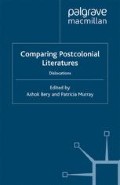Abstract
This essay is offered as a corrective to the uncritical adoption of certain fashionable notions concerning the significance of border-crossing, or what I shall be referring to throughout as ‘hybridity’. Great claims continue to be made for the project of unsettling the border, for breaking out of the prisonhouse of oppositionalist logic into some kind of radically emancipated, free-floating condition where the subject is free to move between the great dualities inherited from the Enlightenment — mind and body, culture and nature, rationality and emotion, self and other, and so on — as well as the great dualities emerging from the history of colonialism — colonizer and colonized, settler and native, active and passive.1 As I shall go on to describe it, hybridity ranges over a number of disciplines in one form or another, emerging from the past as the lost voice of authentic modes of cultural resistance, and in the present as a strategy whereby the postcolonial critic attempts to evade his/her implication in the reproduction of neo-colonialist power. Hybridity is the third space which constantly rehearses and consumes its constituent parts as well as its own possibility, the principle whereby both cultural producer and cultural critic may evade the Hegelian dialectic in which traditional oppositions are resolved. Functioning perhaps as ‘discourse’ did in the 1980s and ‘ideology’ in the 1970s, hybridity is all things to everyone and anyone — anyone who, either by desire or by fate, finds herself on the margins of institutionally organized power.
Access this chapter
Tax calculation will be finalised at checkout
Purchases are for personal use only
Preview
Unable to display preview. Download preview PDF.
Notes
Judith Butler, Gender Trouble: Feminism and the Subversion of Identity ( London: Routledge, 1990 ), p. 31.
Mark Storey (ed.), Poetry and Ireland since 1800: a Source Book (London: Routledge, 1988), ‘Introduction’, p. 8.
David Harvey, The Condition of Postmodernity: an Enquiry into the Origins of Cultural Change (Oxford: Basil Blackwell, 1989), p. vii.
Richard Kearney, ‘Introduction: an Irish Intellectual Tradition?: Philosophical and Cultural Contexts’, in Kearney (ed.), The Irish Mind: Exploring Intellectual Traditions ( Dublin: Wolfhound Press, 1985 ), pp. 7–38.
Seamus Deane, ‘Heroic Ideals: the Tradition of an Idea’, in Field Day Theatre Company, Ireland’s Field Day ( London: Hutchinson, 1985 ), p. 57.
Editor information
Editors and Affiliations
Copyright information
© 2000 Palgrave Macmillan, a division of Macmillan Publishers Limited
About this chapter
Cite this chapter
Smyth, G. (2000). The Politics of Hybridity: Some Problems with Crossing the Border. In: Bery, A., Murray, P. (eds) Comparing Postcolonial Literatures. Palgrave Macmillan, London. https://doi.org/10.1057/9780230599550_4
Download citation
DOI: https://doi.org/10.1057/9780230599550_4
Publisher Name: Palgrave Macmillan, London
Print ISBN: 978-1-349-40534-3
Online ISBN: 978-0-230-59955-0
eBook Packages: Palgrave Literature & Performing Arts CollectionLiterature, Cultural and Media Studies (R0)

